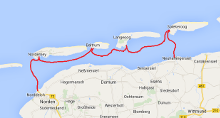| Language and Social Media |  |
 |
 |
 |
East Frisian Islands - Part 1
 Click here for Hugh Horton's essay of this voyage.
Click here for Hugh Horton's essay of this voyage.
- There's a high over the North Sea: said Stefan the morning after the sailing canoe regatta. The edge is over the East Frisian Islands, an easterly wind and stable weather conditions.
The words slowly seeped into my consciousness, displacing the fog of gin and beer left over from the notorious regatta party. Hadn't there been some mischief going on last night with the Swiss flag and a girl in a Heidi costume and wellies, or had I just dreamt it? I looked up: the Swiss flag was hanging at the top of the Hanseat Canoe Club flagpole, flapping in the wind. Easterly wind.
I knew the area from "The Riddle of the Sands" by Erskine Childers. In the book, the two Englishmen Carruthers and
Davies cruise the Wadden Sea around a hundred years ago and uncover an international spy ring. They struggle with fog,
unpredictable currents, sandbars and tides - or rather, use them to their advantage. Our plan was to start in the east
and let us blow westwards, one island after another.
I would never go on such a trip alone. Fortunately, Stefan knows the Wadden Sea well. And the best thing
was that Stefan's perfectly equipped cabin cruiser was already on the trailer and ready to go. But life is
full of surprises.
- I've already got the sailing canoe on the roof rack: Stefan said. - If it's up to me, we can set off.
Hour later we were heading for East Frisland.
In Neuharlingersiel, we loaded our small boats, parked the cars, put on wetsuits and paddled out of the channel.
The sun came out, the fresh wind blew drops from the paddle into our faces and the swell was bearable.
Outside, we set sail and travelled over the sands, the rising current pushing us eastwards alarmingly fast.
I'll die of fear one day, or I'll get used to it.
- All good: said Stefan. - Let's head out. Let's take the rig away in the inlet between the islands and paddle
through the surf square onto the beach.
We pulled the boats over the high water mark on the beach and left them there. The Spiekeroog campsite
was directly behind the dune, in the middle of the wasteland.
- This campsite looks like a Hilleberg tent exhibition: said Stefan.
- Yes, four tents on four square kilometres: I said. - By the way, we're having Swiss fondue
on the camping stove tonight.
As we climbed the pink and tan dune in the evening sun, the first sands began to emerge from the water
to the west.
In Spiekeroog, holidaymakers dine in the evening on halibut by the light of the silver chandelier behind the historic
captain's window, overlooking the rose-hip hedge and the seaweed in the wind-swept front garden.
The average age of the guests was sixty-five. Spiekeroog is a fairytale island, as dozy as Sleeping Beauty.
- How about a beer after work: said Stefan.
- I think we look a bit like Davies and Carruthers. Will they let us in?
Of course they did let us in.
The next morning, the stove kept going off because I had dirty fuel with me. The pretty
pharmacist in the village on the car-free island didn't have enough surgical spirit, but there was lamp oil in the
supermarket. With a different nozzle and proper preheating, the stove had no more problems.
- I once cooked with diesel for a while: I said. - Only when you've eaten bratwurst from a diesel stove
can you say you've really lived.
- Hm: Stefan said. - I read a blog on the Internet where someone fried his folding knife for twenty minutes.
The wooden handle would no longer jam the blade when it gets damp.
- Marvellous: I said. - When you travel, you come home with a lot of good ideas.
On Langeoog, we were allowed to spend the night in the empty boathouse of the sailing club. I woke up to the sound of a steady hiss. As I stepped into the gray morning, I realized that it was the wind pushing around the hall. I had a weak hour until the sun rose. I never know whether I'm ten years too early or a hundred years too late. When the sun is shining, it's very easy to see things soberly and unsentimentally. At night, it's a completely different story.
I remembered Jan standing unexpectedly next to me after the sailing canoe race, his eyes on the Unisee in Bremen,
casually leaning on his cane. What he said was quiet and didn't seem to be addressed directly to anyone:
- Traveling with small boats has a future: said Jan. - Today's generation of pensioners is the last to be wealthy.
The last to be able to afford big boats. After them, there are those with fractal biographies,
job interruptions and career breaks. Out of necessity alone, they have a completely different
leisure and consumer behavior. Anyone who deals with small boats now will never be catched up in ten years' time.
 in a challenging area, the hunting grounds of Carruthers and Davies.
in a challenging area, the hunting grounds of Carruthers and Davies.